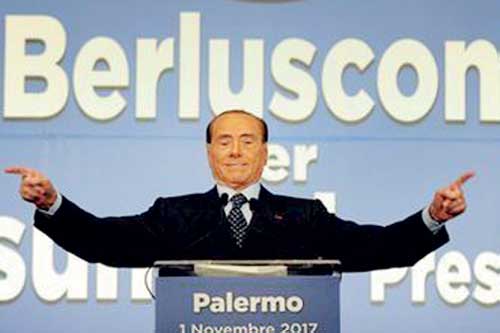Sunday Feb 22, 2026
Sunday Feb 22, 2026
Thursday, 11 January 2018 00:00 - - {{hitsCtrl.values.hits}}
Rome (Reuters): A centre-right coalition around former prime minister Silvio Berlusconi’s party is steadily climbing in opinion polls as a campaign heats up for Italy’s elections on 4 March.
Surveys conducted by Tecne and IPR showed the centre right far outstripping both a centre-left coalition led by the ruling Democratic Party (PD), and Italy’s single most popular party, the anti-establishment 5-Star Movement.
Italy’s complex electoral mix of proportional representation and first-past-the-post makes a hung parliament likely, stoking fears political instability could stunt a modest recovery in the euro zone’s third-largest economy. But Berlusconi’s group looks “very close” to being able to obtain a parliamentary majority, said Tecne chairman Carlo Buttaroni.
The four-time prime minister cannot personally stand for office because of a 2013 conviction for tax fraud.
Support from 39.2% of voters in the Tecne poll takes it towards the 40% which is considered the necessary base for a bloc to have a realistic chance of governing alone. The IPR poll gave it 38%.
As well as clearing this threshold, a party or coalition must beat the second-placed hopefuls by more than 12 percentage points, Buttaroni said. Both Tecne and IPR showed the second-placed 5-Star lagging by 10 percentage points or more.
As support for the PD erodes, 5-Star now comfortably beats it as the most popular party, with a lead of six points according to IPR and more than seven according to Tecne.
Parties across the spectrum have pledged to change or scrap European Union budget rules, cut taxes and spend more.
Berlusconi’s Forza Italia (Go Italy!) and its main ally, the anti-immigration Northern League, have also pledged to change or abolish reforms of pensions and the labour market which have been welcomed by the European Union.
Following a joint pledge over the weekend to halt planned increases in the retirement age, Berlusconi was asked on Wednesday by state radio RAI whether he would scrap the “Jobs Act” that was the flagship reform of former prime minister Matteo Renzi.